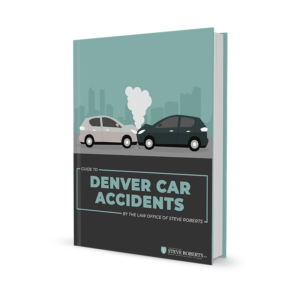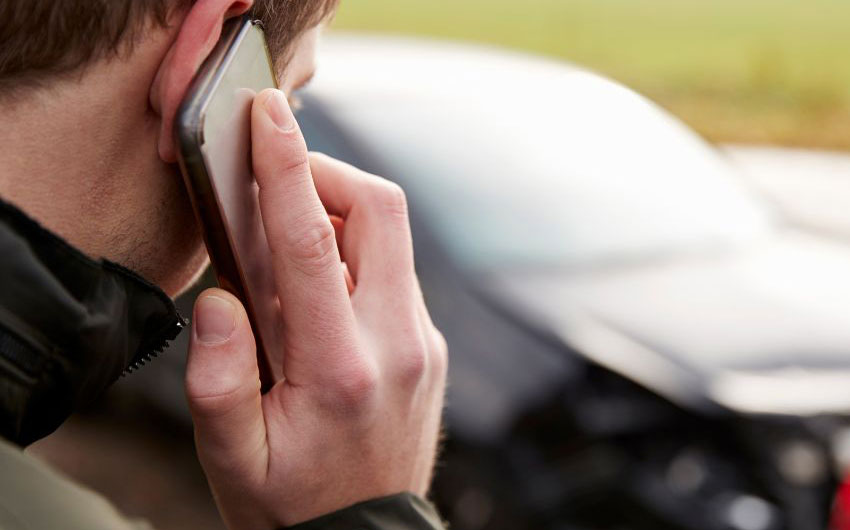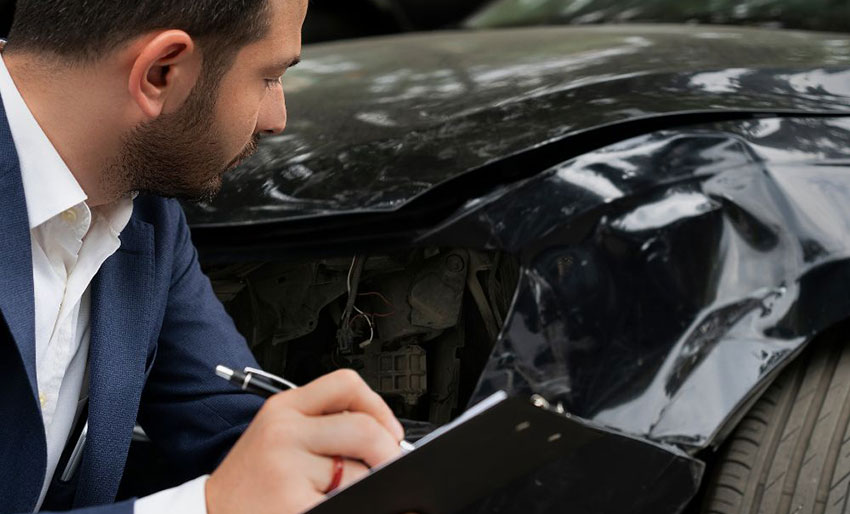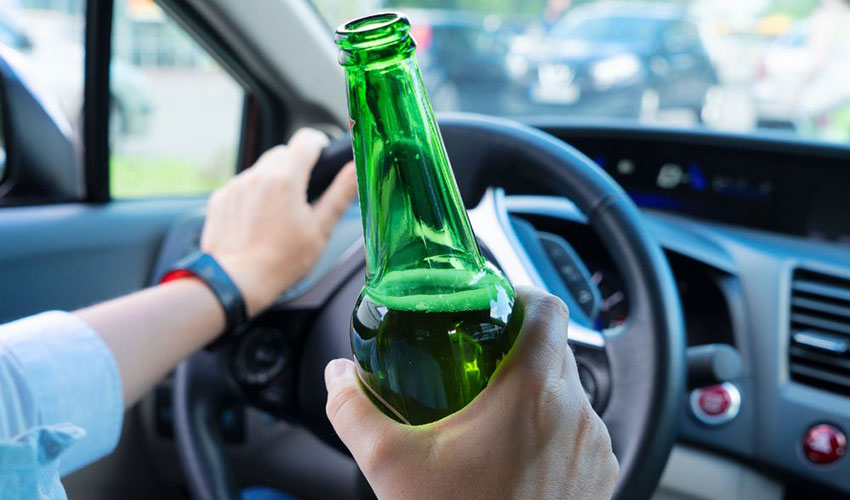
Contact
Steve Roberts, LLC
NO PRESSURE. SPEAK TO AN ATTORNEY. NO HIDDEN FEES.
"*" indicates required fields


Car accidents in Colorado are an unfortunately common occurrence. Even a seemingly minor crash or collision could end up resulting in serious and potentially debilitating injuries that prevent you from working or engaging in hobbies and activities you once enjoyed.
When you suffer car accident injuries, actions in the aftermath can impact your rights. The following are five steps to take after a car accident. Doing this can help ensure you get the compensation you need to recover.
1. Stop immediately at the scene and exchange information with the other drivers involved.
The first thing you need to do after an accident is stop at the scene. You’ll then need to exchange information with the other driver. This will include license numbers, insurance information, vehicle registration, and personal contact. The Colorado Driver Handbook provides more information about this step.
2. Notify law enforcement and take pictures at the scene.
It is important to notify law enforcement right away. The extent of damage does not matter. The police will fill out an accident report. It will include the names and information for all drivers and witnesses who may have seen the car accident occur. You should receive a copy of this report at the scene. You may also request it through the Colorado Division of Motor Vehicles (DMV).
It is also a good idea to use your cellphone to take pictures of the area where the accident occurred, the damage to your vehicle, and any injuries you suffer. These pictures can be used later as evidence in your claim.
3. Get medical attention for your injuries.
Regardless of the severity of your accident you should get medical attention. Many serious injuries have symptoms that can take days or weeks to appear. Failing to get the care you need can result in serious complications. Also, medical records and reports from your doctor will play a large part in your injury claim (particularly if you have head injuries and need a brain injury attorney). An insurance company may deny your claim if you don’t get the care you need.
4. Notify your car insurance company.
No matter who is to blame for your accident, notify your own insurer in the days immediately after. The Colorado DMV requires motorists to carry minimum liability insurance to register a vehicle. You should check your policy for any additional coverage you have. Colorado is a fault based insurance state. This means that the driver responsible for the accident is liable for any damages you suffer.
5. Contact an experienced car accident lawyer before making any statements.
Understand that an insurance company is a business. They have a financial motive for undervaluing or even denying accident claims. Before making any statements or signing any documents, contact Roberts Accident Law. We offer free consultations to discuss your case. We will you on the best course of action to ensure you get the maximum amount of compensation you deserve.
Car accidents happen for a variety of reasons. They can leave you suffering serious, disabling, and life threatening injuries. Road, traffic, and weather conditions may be a factor. But it is often the reckless or negligent behaviors of other drivers that are to blame. Proving fault for car accidents and injuries is crucial. It helps ensure that you get the compensation you need to recover.
Fault is critical when filing an injury claim or lawsuit in the aftermath of a car accident. The following are four ways in which you may be able to prove the other driver was at fault:
The type of accident. When a car accident occurs, and the type of collision and the impact to your vehicle can give clues as to what happened and which driver is to blame:
Police reports. The Colorado Driver Handbook advises notifying law enforcement immediately of any car accident involving injuries or property damages. The police will fill out an accident report. It will list the other drivers and any notes from the scene. This can provide crucial details in proving fault. Accident reports may be obtained at the Colorado Division of Motor Vehicles (DMV).
Witness statements. It is also important to make note of any witnesses who may have seen how the accident occurred. Witness testimony is a key form of evidence in proving blame. Even if they are reluctant to get involved or appear in court, your car accident attorney can subpoena a statement.
Accident investigations. Accident reconstruction experts can examine the facts of a crash. Video surveillance tapes from nearby stores or traffic lights can be useful during this process.
Medical records and statements from your physician also provide key evidence for your car accident injury claim. Regardless of your symptoms, you should seek medical attention right after a car accident.
If you have been injured as the result of a car accident, contact Roberts Accident Law, LLC today. Our Colorado car accident lawyer provides the professional legal representation you need to show the other driver was to blame. We will help you get the maximum amount of compensation you are entitled to for the damages you suffer. We serve Denver and the surrounding areas; call or contact our office online today to request a free consultation and to see how we can help.

The aftermath of a car accident is a confusing, stressful time. You have to deal with medical expenses and property damages. At the same time, your injuries may be causing extreme pain and discomfort. This can add to your financial burden in the way of lost wages.
In the midst of all this, you likely have insurance company claims representatives pressuring you to make statements about the accident and how it occurred. A settlement agreement may be offered quickly or in the weeks and months after your claim has been filed, but there are several factors you should consider before choosing to accept.
There are several factors insurance companies consider when deciding on a settlement amount. These include:
In conducting their investigation, the insurance company will speak with the other drivers involved. They will gather police reports, visit the accident scene, and inspect your vehicle. Determining the amount to offer for settlement can be complex. They often rely on averages when estimating repair costs. Medical records are used to assess the amount of medical costs.
Accident investigations may be superficial at best. There are many claims to handle and resources are limited. It is likely that your initial settlement offer will be well below the total amount you deserve. Once you accept a settlement offer, you will be waiving your rights to any future compensation.
The latest statistics from the Rocky Mountain Insurance Information Association (RMIIA) estimates that the average claim amount for property damages is over $3,000. The average injury claim amount paid was roughly $15,000. Unfortunately, the RMIIA estimates that these amounts cover only 50 percent of the costs. Individual consumers, healthcare providers, and charitable organizations make up the rest.
To compensate you for your losses, an insurance settlement amount should include the following:
Don’t accept the first offer you see. Speak with us first. Contact our Colorado car accident attorney today. You may also want to find out the average settlement for a TBI before accepting any offers At Roberts Accident Law, LLC, we can help negotiate with the insurance company to ensure you get the maximum amount you are entitled to.
One minute you are traveling down the road, out running errands or on your way to work or school. The next you hear a horn blare or the screeching of tires, and find yourself involved in a car accident.
Most of us are unsure of the steps to take to protect ourselves when a crash or a collision occurs. It is normal to want to downplay injuries that may have occurred. This is especially true if the accident was minor. You might assume your own or the other driver’s insurance company will take care of the matter. It’s not always that simple, though.
Here are four signs you should contact a car accident lawyer as soon as possible.
1. You have suffered injuries as the result of the accident.
Even a minor crash or collision can cause injuries that can be serious and disabling. Symptoms can take days or weeks to appear. You should always seek medical care after a car accident. This will help avoid lasting complications and will ensure you don’t jeopardize your claim.
The Mayo Clinic advises that injuries such as whiplash, muscle strains, and head, back, or neck injuries can all have lasting impacts. Injuries might reduce your ability to work or engage in hobbies. An experienced car accident lawyer can help ensure you get the compensation you need. They will calculate lost wages or medical expenses you suffer now and in the years to come.
2. There are questions over who was to blame for the accident occurring.
When you are the victim of another driver’s reckless or negligent conduct, it is vital to collect the evidence necessary to support your claim. Your accident attorney can help in this process. They can get witness statements, obtain video if available, get the accident report, and gather other evidence.
3. You were partially responsible for the accident occurring.
Even if you were partially to blame for your car accident, you may still be entitled to compensation
under Colorado’s comparative negligence statutes. For example, suppose the amount of damages you suffered totaled $100,000 but the Court determine you are 30 percent to blame for the accident. You may still be entitled to recover 70 percent from the other driver, or $70,000.
4. The settlement offered by the insurance company is less than what you feel you deserve.
Insurance companies have a financial motive for either denying or undervaluing claims. You must always keep this in mind. Before making any statements or accepting any settlement offers, contact our Colorado car accident attorneys. We can help negotiate with the insurance company on your behalf. Accepting a settlement means you waive your future rights. Talk to us first, ensure you get the compensation you deserve.
Simply put, Colorado is NOT a “No Fault” state. Instead, Colorado has a “traditional tort” liability system for auto insurance. That means negligence determines who will pay for injuries resulting from car accidents.
Some states have legislation known as “No-Fault” laws that govern liability in car accidents. Twelve US states require insurance policyholders to rely on a “no-fault” method of damage recovery. No-Fault laws may seem a complex at first – but the concept is easy to grasp.
No-fault laws limit injured parties from recovering damages. States with these laws require drivers to carry “no-fault insurance” which. This covers damages up to a certain amount regardless of fault in the car accident. That means if another driver is negligent and hits you causing damages, you still have to file a claim with your insurance company
In the 1970s, Colorado enacted no-fault laws. In fact, 24 states put no-fault laws on the books during
this time period. However, many states removed these laws throughout the years. Colorado’s repealed no-fault laws in 2003. The reason may be economic.
A study by RAND Corporation found that no-fault systems have a higher cost than traditional systems. The could be due to several reasons:
Colorado is NOT a no-fault state. That means you are entitled to recover damages when a negligent driver hits you and causes injuries. For a free consultation on your case, contact Roberts Accident Law today.

After a car accident in Denver, it is important to get a traffic accident report from the Denver Police Department. If your accident was outside the city or on an interstate in Colorado, the State Patrol office likely took down your accident report and you’ll need to get the information from them. The traffic accident report will record the date and time of the accident, the facts and details surrounding the crash, and other pertinent information. Because they hold a position of authority, a report from a police officer carries more weight than a self-filed report.
Colorado State law requires anyone involved in a traffic accident, including those involving another
driver, pedestrian, bicyclist, building, or other property to give their name, address, and vehicle registration information to all others involved. You must also report the accident to the local police by calling the station or 911. For minor cases, it’s usually a good idea to phone the local station and report the accident, as long as all parties are clear from danger and there are no serious injuries. If there is no serious damage and no injuries, the police may not even show up on scene. However, you can also report the incident online.
When you are involved in a serious accident, the best course of action is to dial 911. You want help to arrive as soon as possible to help injured parties, protect the scene, and start clearing debris. When you call 911, you will likely take care of the need to have a police accident report filed. If you’re in Denver, the Denver Police department will arrive on scene and they will take steps to create a traffic accident report.
The report will likely include:
getting a traffic accident report from the denver police department
The information in the report will be highly relevant to your case and any insurance claims that are associated with it. Details such as who the officer believed to be at fault may play an important role in the recovery of damages.
A serious traffic accident will require a police report. If you’ve been involved in a crash in Denver, make sure the police are called to the scene. If you are able, follow up with officers and be sure they are completing and filing a report. You may also want to ask them to send you a copy so it’s easier to locate later.
According to the National Highway Traffic Safety Administration (NHTSA) 37,461 people were killed in car crashes in the U.S. last year and thousands more sustained life-altering injuries. While many of these car accident victims were able to collect compensation for their economic losses, such as the cost of vehicle repair or replacement, treatment-related medical bills, lost wages, and other out-of-pocket costs, those involved in particularly devastating crashes could continue to suffer from the after-effects for years. For instance, many accident victims are forced to undergo multiple painful treatments, come to terms with the loss of a loved one, cope with disfigurements and disabilities, and struggle with anxiety. These costs can take an extreme emotional toll on victims that is not always calculable, so it is fortunate that Colorado law permits victims to collect compensation for these types of intangible losses in the form of non-economic damages. Although many car accident cases are settled out of court, injured parties can still collect compensation non-economic damages if they are represented by an experienced car accident attorney who can protect their interests.
In Colorado, accident victims can collect two types of damages, known as economic and non-economic damages respectively. The former accounts for monetary losses that are relatively easy to account for, such as medical bills and lost wages. Generally, injured parties who can provide proof of these losses through receipts, bills, and invoices can at least collect enough compensation to cover these costs if they go to trial.
However, going to court can be expensive and time-consuming, so if both parties are amenable, coming to an out of court agreement is usually preferable for everyone concerned. The same evidence of loss can be used during these negotiations to establish how much economic loss the injured party suffered. In cases where one driver was clearly at fault, the injured party can expect to collect close to what they would have collected in economic damages in court. When dealing with severe injuries that resulted in permanent disability, victims may even be able to collect a larger sum to cover the cost of future medical bills and treatment.
Non-economic damages, unlike their economic counterpart, are much more difficult to calculate as they account for intangible losses, such as the pain and suffering endured by the victim and his or her family as a result of an accident. Pain and suffering refers not only to the physical pain suffered by the injured party, but also mental trauma resulting from the physical injuries, such as anxiety, shock, mental anguish, and emotional distress. The latter often manifests as depression, mood swings, sleep disturbances, and a loss of appetite, all of which can take an extreme toll on accident victims.
Many courts also award non-economic damages for the following losses:
It can be difficult to put a price on these types of losses. Fortunately, there are a few different calculations used by insurers to estimate pain and suffering during injury settlements.
The first method used to calculate pain and suffering during settlement proceedings is called the multiplier method. Under this method, all economic losses are added up and then multiplied by a second number between 1.5 and five that is referred to as the multiplier. Which number is used as the multiplier depends on a number of factors, including:
During settlement negotiations, it is not uncommon for the parties to disagree about which multiplier should be used to calculate pain and suffering, with the injured party arguing for a higher number and the at-fault party pushing for a lower number. Being represented by an attorney is especially crucial during this part of the settlement process, as they are in the best position to use their experience and negotiation skills to advocate on the injured party’s behalf.
The second approach to calculating pain and suffering is called the per diem, or daily rate method. Under this approach the injured party demands a certain dollar amount for every day that he or she must live with the pain caused by the car accident. In most cases, insurers use the injured party’s daily earnings as a starting point when determining the daily rate to use. Insurers are much less likely to use this method when negotiating with an injured party who is suffering from long-term disabilities, so in these situations, hiring an attorney is imperative, as the settlement will probably be based off similar verdicts and settlements in the area.
Regardless of the method used by the at-fault party’s insurers to calculate pain and suffering, having evidence in medical records is key to the victim’s success, as insurers are much more likely to award a higher settlement if pain and discomfort is recorded throughout the injured party’s doctor’s notes and medical records. Furthermore, injured parties should not expect to settle for more than a $250,000 pain and suffering award, as this is the statutory cap for most cases that go to trial.
In personal injury cases that go to trial, the compensation awarded to the injured party is based on both his or her economic and non-economic losses, so out of court settlements should be based on similar factors. Unfortunately, injured parties who do not retain an attorney run the risk of being taken advantage of by insurers who may offer unfair awards in hopes that the injured party, who is facing mounting medical bills, will be pressured into accepting. To ensure that this doesn’t happen to you, please contact Roberts Accident Law, LLC at (720) 515-7058. A member of our legal team will help you schedule a free consultation with dedicated and compassionate car accident attorney, Steve Roberts, who can help protect your legal rights.

Yes. This is not your only option when you are facing damages related to an injury you suffered in a collision with a drunk driver. You can also file a personal injury claim in an effort to recover compensation for these damages, which can be a less stressful option for you. Before deciding to file a lawsuit or a personal injury claim, talk about your case with an experienced DUI accident lawyer.
Drunk driving is always dangerous, which is why it is policed so rigorously. Throughout the United
States, it is illegal for an adult 21 or older to operate a motor vehicle if his or her blood alcohol content (BAC) is 0.08 percent or higher. In Colorado, a driver under 21 may not operate a motor vehicle if his or her BAC is 0.02 percent or higher. It is also possible to be charged with driving while ability is impaired (DWAI) if a driver is found operating a motor vehicle while his or her BAC is 0.05 percent or higher
In Colorado, the statute of limitations for car accident claims is three years from the date of the accident. This means that after you are hit, you have three years to develop your case and file your lawsuit in court.
When a driver is charged with driving under the influence (DUI), he or she is facing a criminal charge. Criminal charges are different from civil charges. Criminal charges are imposed by government authorities, such as law enforcement or public prosecutors. When an individual is found guilty of a criminal charge, he or she is convicted and sentenced to penalties that can include jail time and fines.
Civil charges are imposed by private parties who suffer damages because of violations on the part of the accused party. If you decide to file a lawsuit against the drunk driver who hit you, you are the plaintiff in a civil case. An individual can simultaneously face criminal and civil charges. Even if the driver is not found guilty of DUI, he or she may be found negligent in your case and required to compensate you for your damages related to the accident.
Often, personal injury lawyers advise clients to file insurance claims before pursuing lawsuits. Although personal injury claims must be handled according to state law, they are not legal actions. Rather, they are formal requests made to insurance providers asking for compensation in accordance with their insured clients’ policies.
Your claim is as strong as the evidence you provide to support it. Your lawyer can help you obtain and make use of evidence that shows how the drunk driver’s actions directly caused your injury.
The driver’s DUI charge is one piece of evidence that can demonstrate his or her negligence, but it does not tell the whole story. In order to recover adequate compensation for your damages, you need to show that you were a victim of the drunk driver’s actions and that because of the accident, you suffered an injury that caused you to face specific monetary losses. These losses can include:
Your lawyer can work with the drunk driver’s insurance provider to negotiate an appropriate settlement for you. This can take a few months and sometimes, a year or longer. During this process, it is important that you follow your lawyer’s instructions for interacting with the insurance provider. You might be asked to make an official statement about the accident or to accept a settlement shortly after filing your claim. Before any interaction with the insurance provider, speak with your lawyer about what to say, what to do, and what to avoid.
Keep the statute of limitations for personal injury lawsuits in mind even if you pursue a claim with the driver’s insurance provider. Sometimes, attempts to reach a settlement go nowhere and the victim’s only remaining chance at reaching a recovery is to file a lawsuit. If you feel this is the direction your case is taking, talk to your lawyer about litigating the case. Letting the statute of limitations expire means losing your right to recover compensation for your damages, which can put a permanent financial burden on you and your family.
Before you file a personal injury lawsuit, understand that there is no guarantee that the court will rule in your favor. There is also no guarantee that filing a personal injury claim will result in a settlement, but often, an insurance claim is more likely to result in some compensation than a lawsuit.
In many cases, it is impossible to file a lawsuit after you have accepted a settlement from the negligent driver’s insurance company. Think about this carefully: if you accept a settlement, that is all you will be able to recover for that specific injury’s damages. You likely could recover more compensation through a successful lawsuit, but the court could also rule against you, resulting in nothing for your damages. Clients facing serious and permanent injuries, like paralysis and the loss of a significant organ, are often advised to pursue lawsuits.
If you are injured in a collision with a drunk driver, the first thing you need to do after the accident is receive medical care for your injury. Receiving prompt care will increase your chance of making a full recovery, and being able to demonstrate that you sought care in a timely manner can help support your case. After you have received the treatment you need, contact an experienced car accident lawyer to discuss your rights and legal options for pursuing compensation for your damages. Contact Roberts Accident Law, LLC today to set up your free case evaluation with us to learn more.
Contact Roberts Accident Law Denver Injury & Accident Attorney today to find the out how we can help you get the most compensation for your car accident claim. Just see how we have been able to help others just like you in Colorado.
Steve Roberts helped my tremendously when I was injured in a car accident. He took care of dealing with all the insurance company issues, and he was extremely knowledgeable in handling my case!
Rebecca M (see our 5.0 average rating and 32 Google reviews here)
⭐⭐⭐⭐⭐
I had a great experience with Steve. I was hesitant to hire an attorney after I was rear-ended. I had ideas of handling things simply on my own. Quickly I discovered I was in over my head. Steve stepped in and changed everything. I was talking to five different people from the insurance companies and they were overwhelming me with questions, requests and demands. It was hard to focus on my actual injuries. Then I hired Steve and that all changed. My injuries were more severe than I originally thought and had Steve not slowed things down I would have been in big financial trouble. The resolution to my case was not about wringing money out of the insurance company but about helping put me back in the place I was before my accident. Steve always had time to talk to me personally and kept things moving all the time. Honestly, this whole experience was pretty scary but Steve allowed me to live and recover without fear. Thank you Steve.
Brandon Rutledge (see our 5.0 average rating and 32 Google reviews here)
⭐⭐⭐⭐⭐
NO PRESSURE. SPEAK TO AN ATTORNEY. NO HIDDEN FEES.
"*" indicates required fields

NO PRESSURE. SPEAK TO AN ATTORNEY. NO HIDDEN FEES.
"*" indicates required fields